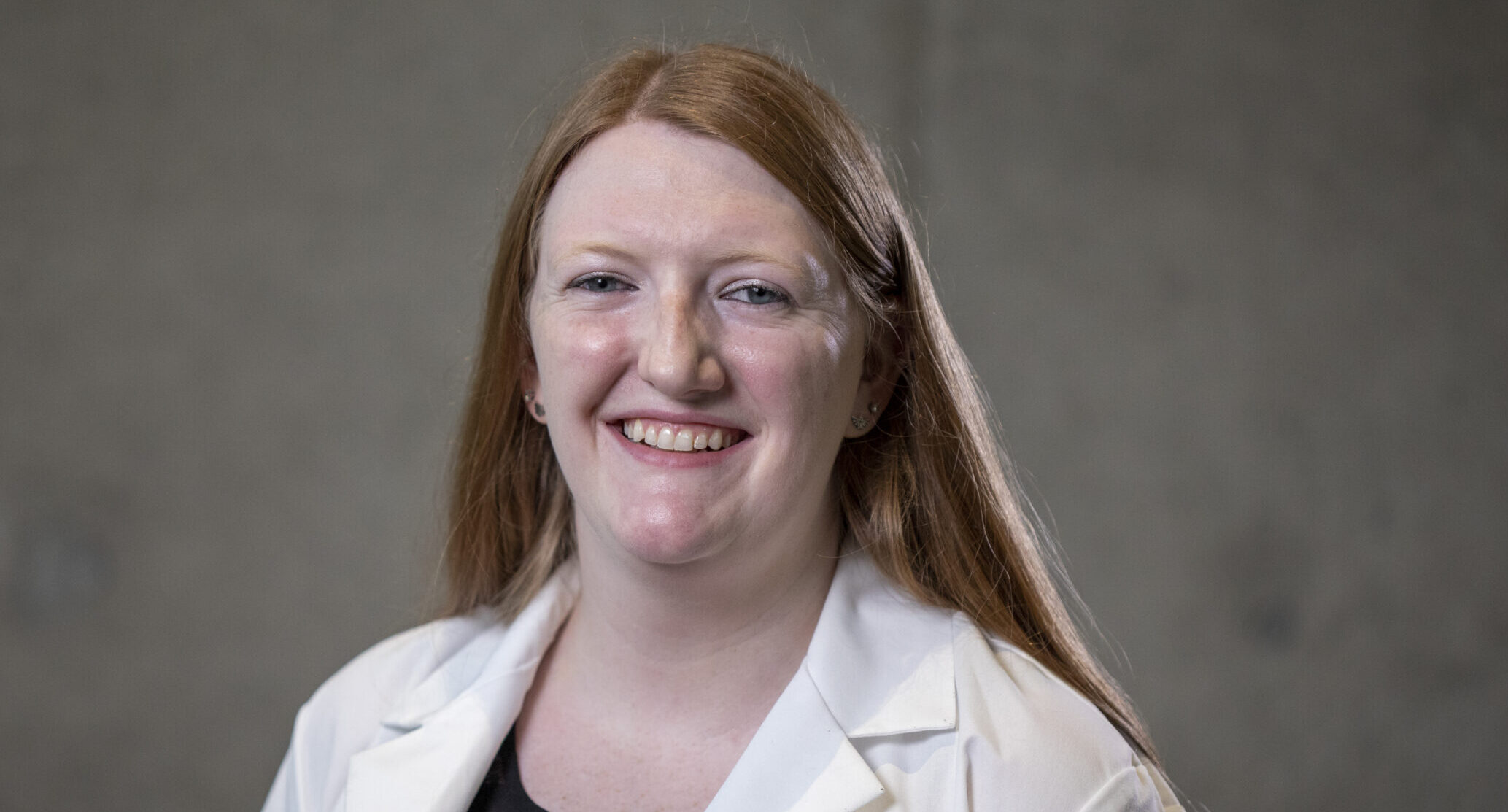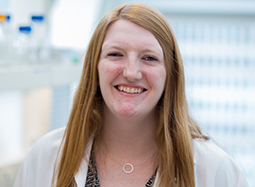Graduate student spotlight: How molecular ‘punctuation marks’ influence cancer and other diseases
November 16, 2020

Throughout the year, we highlight Van Andel Institute Graduate School’s doctoral students. This month features Bailey Tibben, a student in the lab of Dr. Scott Rothbart. Bailey studies how special molecular marks regulate the instructions in our genes, a process that influences cancer and many other diseases.
Q: What do you study?

BT: Epigenetics is the study of changes in how the instructions in our genetic code are carried out without actually changing the code itself. A gene sequence is similar to a series of letters that spell out a word or a phrase — that word encodes for a protein, and that protein has a specific job within the cell. Epigenetic changes can be likened to the punctation marks within a sentence that change how it is read. I study these epigenetic “punctuation marks,” which are chemical modifications that occur on DNA, and special proteins called histones. Histone proteins are the proteins that help organize our DNA; they are often represented as “beads” on a string of DNA. I am interested in how the chemical modifications on the beads “talk to” the chemical modifications on the DNA. Understanding how these two marks communicate with each other will help us better understand their miscommunication in cancer and other human diseases so that we may design targeted therapies to treat them.
Q: What is your primary motivation for persevering through graduate school?
BT: I am motivated by my desire to give back to society and to my family, particularly my parents. My parents have always been my biggest supporters in all my endeavors, and they have gone above and beyond to ensure I always had everything I needed to succeed in life. Making them proud is one of my greatest accomplishments, and I only hope that I will one day be successful enough to give back to them everything they have given to me, and more. Additionally, I am motivated by the work I do. It is extremely gratifying to work in the biomedical research field, knowing that I am contributing to the advancement of science and medicine while simultaneously satisfying my intellectual curiosity.
Q: What do you want to do with your degree?
BT: After I receive my Ph.D., I would like to pursue a laboratory genetics and genomics fellowship in a hospital or university medical center. My ultimate goal is to serve as the director of a clinical genetics and genomics laboratory in order to aid in the diagnosis and treatment of human disease.
Q: Did you take time off before starting your Ph.D. degree or come directly from an undergraduate or master’s degree program?
BT: I started the Ph.D. program directly after receiving my B.S. from University of Arizona. I have always loved school and learning, and I couldn’t wait to take the next step in my educational journey. Looking back on it, I think it would have been nice to take a break and travel or spend more time with my family, but then I wouldn’t be a part of my awesome cohort, with whom I’ve made very close friendships!
Q: How has your previous coursework contributed to your breadth of knowledge?
BT: My bachelor’s degree is in molecular and cellular biology, so I had a pretty strong foundational knowledge coming into the Ph.D. program, which helped me get started during the first-year classes. However, I had to quickly pick up new skills in order to effectively apply that knowledge and learn to think more critically when reading scientific literature. By the end of the first year, I was amazed at how much I had learned and how much more confident I felt as a researcher.
Q: What is your favorite stress-reduction technique?
BT: Baking! I love to bake cookies, brownies and other treats for my family, friends and co-workers. Baking itself is a science and I enjoy the procedural aspects of it, but on top of that I love spreading joy by making baked goods for the people around me.
Q: What accomplishment (academic or other) are you most proud of?
BT: I am extremely proud of my unending drive and self-motivation. I am proud of myself for moving first to a new city (from Mesa to Tucson, Arizona), and then to a new state (from Arizona to Grand Rapids, Michigan) to pursue my education. Growing up, I was extremely shy and reserved and I dreaded doing anything alone, so it’s amazing to look back at all the steps I’ve made to get myself where I am today and realize how much I’ve grown as an individual.
Q: Why did you choose Van Andel Institute Graduate School?
BT: I was attracted to Van Andel Institute Graduate School’s problem-based learning curriculum, its small size and the translational focus at VAI. When I started my undergraduate career, I thought I wanted to go to medical school. By the time I was a sophomore, I realized that seeing patients wasn’t actually what I wanted, but I still wanted to work in the clinic as a researcher. Starting graduate school at VAI, I felt like I could get a head start on translational research by studying molecular and cell-based mechanisms of human disease. When I interviewed at VAI, I was very impressed with the curriculum. It felt refreshing knowing I wouldn’t be stuck in lectures all day, as was the case in undergrad. Also, during my interview at VAI, I felt an overwhelming sense of belonging and support that I had not felt anywhere else. With these things in mind, it was clear to me that the Graduate School was the right fit!
Q: If you hadn’t been admitted to graduate school, what do you think you would be doing right now?
BT: There are two things I could see myself doing if I weren’t pursuing a Ph.D. in molecular and cell biology: working in a bakery or working in higher education. As I already mentioned, I love to bake and many of my family and friends have told me I should sell my baked goods, so I think I would enjoy working in a bakery and could be quite good at it. Alternatively, because I spent all four years of my undergrad working as a tutor, I could see myself working in higher education. I really loved helping my peers and being a source of support and guidance for underclassmen. If I didn’t love science and research so much, I might have pursued a master’s degree in higher education to continue working with students and helping them be the best they can be!